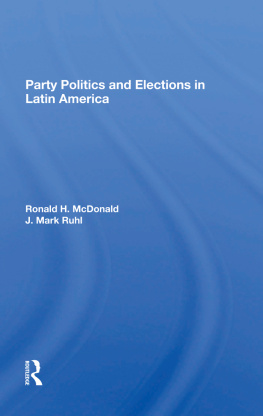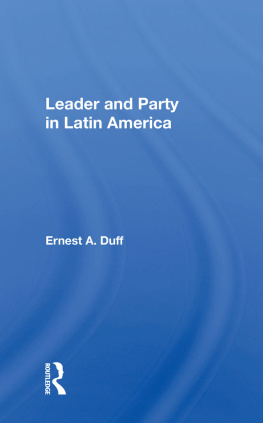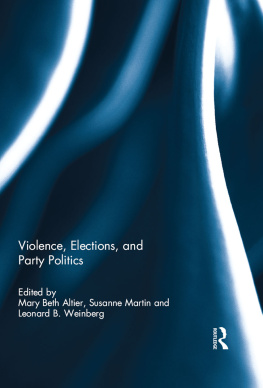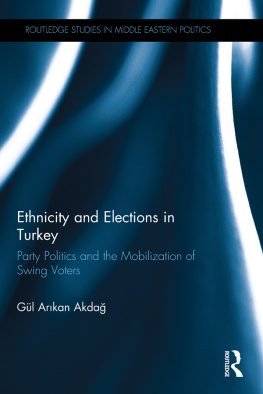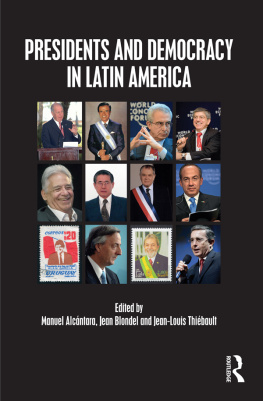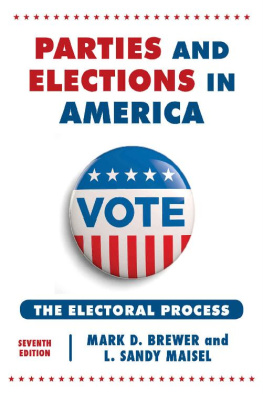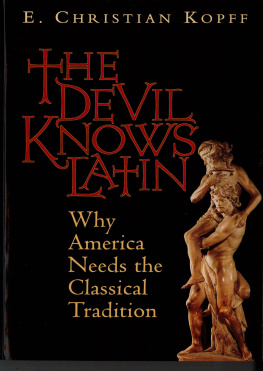Party Politics and Elections in Latin America
About the Book and Authors
Latin America has one of the longest histories of active party politics and elections of any region in the world, yet the experiences there have been very different from those of Western Europe and the United States. In Latin America, party politics has produced governments ranging from democratic to authoritarian, with considerable variations among nations as well as fluctuations within countries over time.
This text provides a comprehensive comparative review of party politics in each Latin American country. The evolution of specific parties is examined, and special emphasis is given to the behavioral aspects of voting patterns and party affiliation. In addition, Drs. McDonald and Ruhl discuss each country's distinctive patterns of organizing and holding elections, including the laws and procedures that regulate them. Finally, the authors identify the general experiences the countries share, especially the long-term impact of sustained modernization on national party politics. The book provides students with a general framework for interpreting party politics in individual countries and for understanding how politics is linked to Latin America's economic development, democracy, and political stability.
Ronald H. McDonald is professor of political science at the Maxwell School of Syracuse University. J. Mark Ruhl is professor of political science at Dickinson College.
Party Politics and Elections in Latin America
Ronald H. McDonald
Syracuse University
J. Mark Ruhl
Dickinson College
First published 1989 by Westview Press
Published 2019 by Routledge
52 Vanderbilt Avenue, New York, NY 10017
2 Park Square, Milton Park, Abingdon, Oxon OX14 4RN
Routledge is an imprint of the Taylor & Francis Group, an informa business
Copyright 1989 by Taylor & Francis
All rights reserved. No part of this book may be reprinted or reproduced or utilised in any form or by any electronic, mechanical, or other means, now known or hereafter invented, including photocopying and recording, or in any information storage or retrieval system, without permission in writing from the publishers.
Notice:
Product or corporate names may be trademarks or registered trademarks, and are used only for identification and explanation without intent to infringe.
Library of Congress Cataloging-in-Publication Data
McDonald, Ronald H., 1935
Party politics and elections in Latin America.
Includes index.
1. Political partiesLatin America. 2. Elections
Latin America. 3. Public opinionLatin America.
I. Ruhl, J. Mark, 1948- . II. Title.
JL969.A45M37 1989 324.28 87-14278
ISBN 13: 978-0-367-28233-2 (hbk)
To Shirley
and to Michael and Martin
Contents
- PART ONE
SINGLE-PARTY SYSTEMS - PART TWO
TWO-PARTY SYSTEMS - PART THREE
EMERGING TWO-PARTY SYSTEMS - PART FOUR
MULTIPARTY SYSTEMS - PART FIVE
EMERGING MULTIPARTY SYSTEMS
- PART ONE
SINGLE-PARTY SYSTEMS - PART TWO
TWO-PARTY SYSTEMS - PART THREE
EMERGING TWO-PARTY SYSTEMS - PART FOUR
MULTIPARTY SYSTEMS - PART FIVE
EMERGING MULTIPARTY SYSTEMS
Guide
This book is an introduction to party politics, elections, and electoral behavior in Latin America. The subject is vast and the available research on it extensive. Our principal purpose is to summarize and conceptualize the subject, making comparisons where appropriate among nations. We try to point out both the specific, parochial experiences of individual Latin American nations as well as the more universal experiences.
We have explicitly limited our focus to political parties and elections, but there are some subjects pertaining to them that we have intentionally excluded. We are not concerned, for example, with revolutionary organizations or guerrilla movements that have not engaged in electoral activity, even though they may term themselves political parties. Neither do we analyze in depth the development of political ideologies, except as they become important in electoral contexts. These subjects have been thoroughly discussed elsewhere, and we do not feel they are sufficiently relevant to our objectives for inclusion here. We have tried to give weight to political parties and elections with regard to their importance, prominence, and endurance and to countries according to the political significance of their parties and elections: party politics and elections are more complex, part of a longer heritage, and simply more relevant for generally understanding politics in some countries than in others.
We have attempted, in addition, to avoid imposing ideological or political frameworks on our analysis. It is not our intention to pass judgment on the morality or desirability of specific political parties but rather to assess their political evolution, activities, successes, and failures. Our primary tasks are description and explanation. We leave the right and the responsibility for passing judgment on Latin American political parties to those who must live with them.
Neither is this book designed as a "general theory" of Latin American party politics. Our limited objective is to summarize each country's experience with parties and elections, provide what we trust is a reasonable and coherent interpretation of that experience, and summarize some of our recurrent findings. The analytic terms and concepts we employ are discussed either in the first chapter or as they are introduced in the text.
Our book is intended primarily for those with some background either in political science or Latin American studies, although we assume the references and concepts we employ are sufficiently clear to be accessible to the general reader. The book is not an introductory text on Latin American politics. There are many subjects beyond our scope that would be appropriate for a general introduction. Instead, our effort should supplement general texts by providing greater detail and depth on what we consider to be an essential, interesting, and important aspect of Latin American politics. We have tried to include election results through the time of our writing and expect that subsequent elections will be generally consistent with the long-term trends we identify. Party politics is regularly interrupted in some nations by military coups and repression. Such interruptions are inevitable, but they should not alter the fundamental political analysis presented here.
Our country chapters are divided along similar lines, and similar questions are raised in each. The organization of these chapters, however, varies in response to the realities of the different countries, in recognition of the fact that not all the questions we raise are equally important in all nations. McDonald took primary responsibility for the chapters on Paraguay, Uruguay, Venezuela, Argentina, Chile, Bolivia, Brazil, Ecuador, and the Dominican Republic and for the Conclusion; Ruhl was responsible for the Introduction and the chapters on Cuba, Nicaragua, Mexico, Colombia, Honduras, Costa Rica, Peru, Panama, Guatemala, and El Salvador. English names are used for parties throughout the book along with their Spanish or Portuguese acronyms, and a glossary with their Spanish or Portuguese names is provided for those we discuss. We urge those interested in pursuing the subject further to consult the references provided at the end of each chapter.


